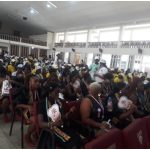THERE IS PUBLIC concern for road network everywhere; as such, there is a need for the national priority bill pending before the House of Representative—to amend the act creating the National Road Fund of Liberia (NRF)—to be amended in order to strengthen the NRF and make it more responsive in handling its operation.
EVERYWHERE ACROSS THE nation there is a concern for road network, and the reason for this is roads help to improve access to economic, health and education activities—every aspect of life. So, with good road network there can be easier opportunities for the Liberian people. The NRF therefore has to be strengthened by restructuring the legislation that created it so that it can become autonomous, have more strength and be responsive to its own operation activities.
THE NRF AMENDMENT bill has to be looked at from all dimensions and context. At present, the road fund has limited autonomy, but if it is placed within its own framework, where the entity will be able to raise the funds through the proper channel, then there would be the opportunity for high accountability.
IT HAS BEEN observed that road network is one of the near-successful pillars of the “Pro-Poor Agenda for Prosperity and Development (PAPD)”, with the Ministry of Public Works affirming the fact that it has been heavily supported by the Road Fund Office. The Chief Executive Officer of the NRF, Boniface Satu, has therefore underscored that the only way the NRF can reach the peak of its performance is by elevating its status to an autonomous agency, which will then capacitate the agency to source funding, mitigate fund flow risk and allow matching funds and international financial institutions to lend money for road infrastructure.
ACCORDING TO SATU, the NRF was established to improve on road financing and management, but refusing to grant the entity an autonomous status could hamper it from achieving its goals. He disclosed that the NRF of Liberia is still at a first generation stage, thus heavily controlled by the government, which he said is somehow causing donor fatigue toward financing its projects.






